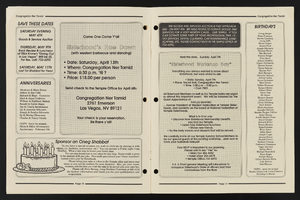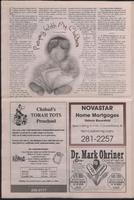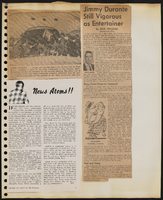Search the Special Collections and Archives Portal
Search Results
Hayes, Grace, 1895-1989
Grace Hayes was born on August 23, 1896 in Springfield, Missouri. She moved to San Francisco, California at the age of ten, and began to sing at nightclubs at the age of fourteen. In 1912 Hayes married Joseph Lind, and their son Joseph Conrad Lind (better known as Peter Lind Hayes) was born in 1915. She married twice after Lind; first to Charlie Foy, then to Robert Evan Hopkins. Hayes is best known for her career in motion pictures from 1929 to 1950, primarily for King of Jazz (1930) and Zis Boom Bah (1941).
Person
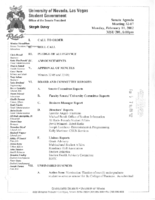
Meeting minutes for Consolidated Student Senate University of Nevada, Las Vegas, February 11, 2002
Date
Archival Collection
Description
Text
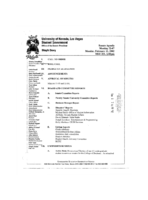
Meeting minutes for Consolidated Student Senate University of Nevada, Las Vegas, February 07, 2002
Date
Archival Collection
Description
Text
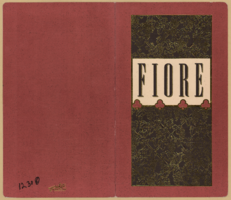
Fiore menus
Date
Archival Collection
Description
From the UNLV University Libraries Menu Collection -- Las Vegas, Nevada restaurants -- Hotel and casino restaurants -- Rio Hotel and Casino file.
Text
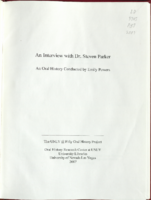
Transcript of interview with Dr. Steven Parker by Emily Powers, December 19, 2006
Date
Archival Collection
Description
Text
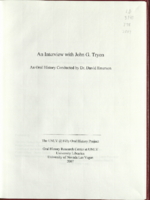
Transcript of interview with John G. Tryon by Dr. David Emerson, February 21, 2006
Date
Archival Collection
Description
Text

Emilia Marquez oral history interview: transcript
Date
Archival Collection
Description
Oral history interview with Emilia Marquez conducted by Maribel Estrada Calderón on July 5, 2019 for the Latinx Voices of Southern Nevada Oral History Project. Claytee D. White and Emily Lucile are also present during the interview. Emilia Marquez was born in the United Stated and raised in Alexandria, Virginia, where her father worked as a bricklayer, until the age of twelve, when her father decided to move the family back to Uruguay. She describes acclimating to her new life in middle school and her shift from being perceived as an outsider in Uruguay to accepting Uruguay as home. She describes life in Uruguay and the positions that her family held while living there. After meeting and marrying her husband they trained to work in a casino. She trained as a slot machine operator, and her husband trained as a dealer. This eventually led them to leave Uruguay for the U.S. After the encouragement of her father and mother, she moved with her mother to Las Vegas to work in the casino industry. She describes working as a change person at the Luxor before moving to the newly opened Palms, where she worked until she left it to work at the Wynn. She ends the interview talking about various Uruguayan dishes and traditions, and a brief history of Uruguay. Subjects discussed in this interview: Uruguay, immigration, Las Vegas Strip, Latinx, Luxor.
Text

